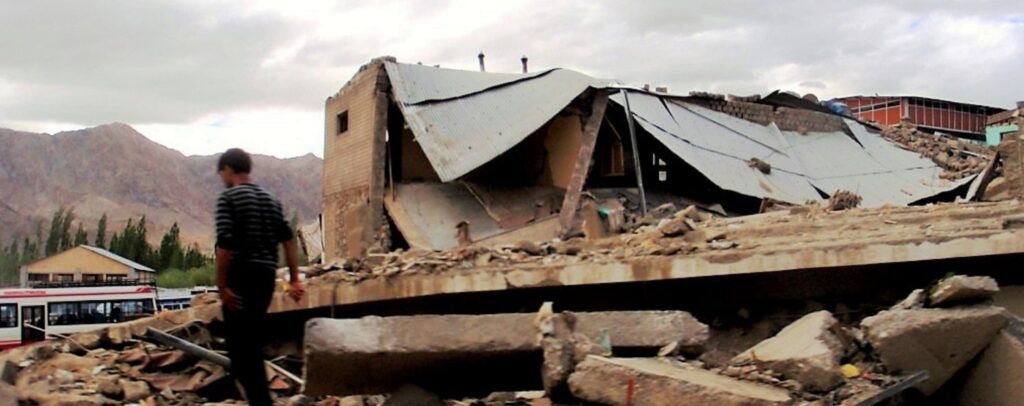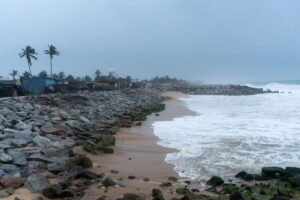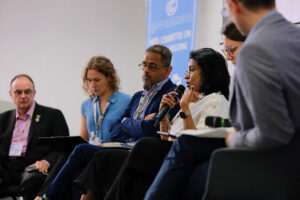Now, A Radical New Proposal To Raise Finance For Climate Damages
Nov 19, 2025 | Pratirodh Bureau
Floods in Ladakh, 2010. A new proposal attempts to reimagine how climate finance for loss and damage, as well as climate adaptation, can be raised (Image by John Hill via Wikimedia Commons)
- The Loss and Damage Fund, established at the climate conference in 2022, is still finding its feet and struggling to raise money.
- A new proposal seeks to combine taxation, direct benefit transfers and insurance to raise and disburse climate finance more effectively and equitably.
- The plan would require low- and middle-income countries to adopt a progressive carbon price or tax, while high income countries would create regular sources of funding.
After years of debate, countries agreed to establish a fund for losses and damages from climate change at the 27th Climate Conference of Parties (COP27), under the UNFCCC that took place in 2022. At the time, its establishment was hailed as a recognition of the unequal impacts of global warming on poorer countries. Three years later, however, the Fund for Responding to Losses and Damages (FLRD) is still finding its feet and struggling to raise money.

Currently, the FLRD has accepted voluntary pledges amounting to $768 million from 28 countries. Of these, 22 countries have signed contribution agreements, and 19 have released initial funding commitments. But these pledges are woefully inadequate: The actual cost of disasters is estimated to be over $2.3 trillion annually when cascading and ecosystem costs are taken into account. A fresh round of funding requests for FLRD will open in mid-December, with disbursals expected to start by June 2026.
A new proposal by Nobel Laureates Abhijit Banerjee and Esther Duflo, and Professor of Economics at the University of Chicago, Michael Greenstone, attempts to reimagine how climate finance for loss and damage, as well as climate adaptation, can be raised. It proposes combining taxation, direct benefit transfers, and insurance to raise funds, disburse them swiftly and equitably, and incentivise mitigation in poor countries.
Called the “grand bargain for climate mitigation, adaptation and compensation,” the proposal seeks to address multiple concerns in climate finance governance, including curbing future emissions in developing countries, making sure money goes where it’s supposed to, how the money is calculated, and where it should come from.
“We’re not proposing this as a replacement to anything. The objective is to have a system that is attractive enough on one side, for countries to really commit to reducing carbon, and attractive enough on the other side, to get rich countries to commit to pay,” said Banerjee.
Calculating damages and disbursing funds
Though there are ambitions to raise $1.3 trillion in climate finance over the next decade, rich countries have traditionally opposed compensatory payment for damages due to climate change, and have only committed to mobilising $300 billion in climate finance by 2035. “Right now, rich countries are taking money out of other climate funds and putting it into loss and damage, so the funding isn’t additional,” explained Ritu Bharadwaj, director of climate resilience and loss and damage at the International Institute for Environment and Development, who did not contribute to the proposal.

Voluntary pledges into the UNFCCC funds are “minimal, and we could expect this to continue,” the proposal says.
The first element of “grand bargain” lies in calculating how much rich countries owe poorer ones for the damages inflicted on them. Using mortality from heat as an indicator, the researchers calculate the social cost of carbon in Low Middle Income Countries (LMICs) for every tonne of carbon dioxide or its equivalent emitted by OECD countries. “Temperature related mortality accounts for the majority of estimated damages in LMICs, and it is relatively easy to put a number on it. Moreover, restricting the calculations to this category makes our estimate conservative, protecting it against accusations of climate alarmism,” says the proposal. According to this calculation, OECD emissions in 2022 will lead to at least $1.8 trillion in mortality damages in LMICs, at approximately $130 per tonne.
The second element includes disbursing funds to affected individuals and communities through direct benefit transfers. The first tier is for regions worst affected by heat, entitling all individuals to a Universal Basic Income. The second tier is for other affected countries, who receive a weather-triggered basic income, released automatically when heat wave related thresholds are crossed in certain regions. Apart from income-based transfers, the proposal includes allocating community grant transfers, which would allow communities to build adaptive measures, like protecting households, repairing damages, and installing air conditioning in schools. Finally, the proposal also includes a provision for disaster insurance, which would cover part of the costs of damage experienced.
The total estimated costs of implementing this system, called Foreseeable, Automatic, Immediate, Regular (FAIR), is projected to be $737 billion, which is much less than the total of what is owed, and is a conceivable starting point, said Banerjee.
“We wanted to prioritise automaticity to LMICs because a big concern among donor countries is that money is not going where it’s supposed to once it’s given,” he said, adding, “When payments are automated, they’re going exactly where they are supposed to. The recipient country also benefits because it removes internal tensions of deciding between different spending priorities. It’s also a useful way to change behaviour. We want people to say, “We’re not going to work today because it’s too hot”, and key to that is certainty of payment.”
The “bargain” for developing countries
To participate in the scheme, however, LMICs must commit to disbursing the funds through the FAIR mechanism, and agree to impose a progressive carbon price or tax, the proposal says. A tax would “serve as a signal of the willingness to take serious steps in reducing emissions,” which is necessary because LMICs are projected to emit the vast majority of carbon over the remainder of the century, as they develop. To make this proposal more politically attractive, the researchers suggest revenues generated stay within each LMIC country.
Instead of focusing on a meeting target “needs-based” figure, the “grand bargain” proposes rich countries commit to putting in place regular sources of funding which can be allocated for climate damages. These funds must come from public sources, the researchers argue, because “there is no private money to be made in compensating the world’s poorest for the climate damages they experience.”
Possible sources of funding for the FAIR mechanism can come from two taxes: the Pillar 2 OECD tax, which ensures large multinational enterprises pay a minimum level of tax on the income arising in each jurisdiction where they operate, and a proposed billionaires tax, which would tax the 3,000 richest billionaires 2% of their income. “These two sources alone would raise $500 billion a year for now, enough to fund the current spending needs,” the proposal says.
Challenges in implementation
The proposal is a radical shift away from how existing funds under the UNFCCC function. The Fund for Responding to Losses and Damages, which is still in its “start-up” phase, has agreed to release between $5 million to $20 million in grants per proposal/funding request by developing countries, with a minimum 50% floor allocated to least developed countries and small island states.
“There is a need to reimagine climate finance because at the moment, all these funds are acting in silos, and the governance architecture of these funds takes away a bulk of the finance. Setting up boards, modalities, and management structures makes the process rigid and inefficient,” said Bharadwaj. She had written about how direct benefit transfers could help cut through these barriers by taking advantage of social welfare systems already existing within low- and middle-income countries.
However, she isn’t optimistic the proposed bargain will raise the funds necessary. “The problem is there is an unwillingness to pay even the smallest sum. One promising way forward to make countries pay is through litigation,” she said.
(Published under Creative Commons from Mongabay India)
